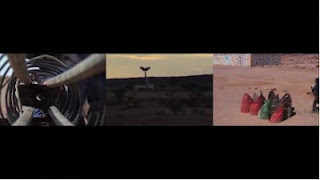The Reina Sofía Museum, in Madrid, hosts the presentation of ARTifariti 2012 with a roundtable on art, conflict and human rights.
 |
| Performance Gdeim Izik (students of the Art School of Mostaganem). International Encounter of Art Students and Saharawi Refugees |
After the Arab Spring, which was born in the Western Sahara, is it possible to have a proactive type of art, at the same time transformational, that provokes real social change?
The American philosopher Noam Chomsky suggested to the world that the waves of protest that originated in North Africa had really started in Western Sahara at the end of 2010. In fact, the organisational scheme that was imposed in the freedom squares and that Evru collected for the project "The book of the squares" for ARTifariti 2011, had previously designed in the camp of dignity of El Aaiun, Gdeim Izik, brutally dismantled on November 8 by the Moroccan forces with terrible consequences. The same patterns were repeated, as if in a chain revolution, in Western Sahara, Tunisia, Egypt, Libya, Yemen... The popular action managed to modify the course of history in many of this places. And among the people demonstrating in the squares, there were cyberactivists and artists who used the Internet to spread their messages and images of change.
Last June 29, in the space REDES of the Reina Sofía Museum, the seminar "Art, conflict and human rights. ARTifariti" took place. At the same time, and supported by a video edited by Jan Busowsky, ARTifariti 2012 was presented. The 6th edition of the International Art Encounters of the Western Sahara will be starting next October 20. Its commissioner, Isidro López-Aparicio, has launched a defying proposal: "The ideal project, the one we are looking for, will free the Saharawis from their exile in the refugee camps. While we wait for this one, every proposal that contributes to give them a voice, take the to the present time and help them to get out of the isolation the have been immersed into through the art will be welcome."
Apart from the invited group, made up of creators who in a certain way have already made their revolution, such as Isidoro Valcárcel Medina, Esther Ferrer, Gao Brothers, Santiago Sierra, Democracia, Gilles Fontolliet, Mohammad Shaqdih, Los Torreznos, Miquel Barceló, Antoni Muntadas, Andreas Kaufmann, Alain Ayers, Daniel G. Andujar, Left Hand Rotation, Tom Hall and the "bus of Art"; any artist could present a proposal.
 |
| Documentary by Jan Bosowsky and Isidro López-Aparicio |
Can art really detonate these changes? This was the core of the debate that took place after the presentation with Isidro Valcárcel Medina, Pablo España, poet Bahía M. Awax and Isidro López Aparicio.
Since 2007, ARTifariti has been promoting contemporary artistic practices as tools of demonstration, transformation and activation of a specific social, cultural and geopolitical context. A yearly encounter whose central theme is the conflict that derived from the "decolonisation" of the Western Sahara and the continues violations of collective and individual human rights in this territory. ARTifariti is part of an international group of activities and projects that examine the relationship of art and human rights while promoting the art linked to a local community and outside the study room or the museum.
The project is framed in a multi directional and interdisciplinary structure that is thought to address creative spaces at different levels: international encounters of students, diverse actions, communication technology labs and seminars about contemporary arts and culture. Every year, international and local artists share projects that link art and social commitment in an open encounter that aims to enrich and ensure the continuity of the social network in which it is structured.
 |
| Isolation. Isidro López-Aparicio |
Please note: information and pictures taken from ARTifariti's blog.




